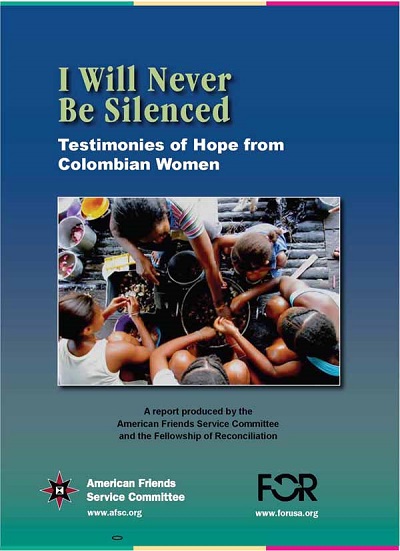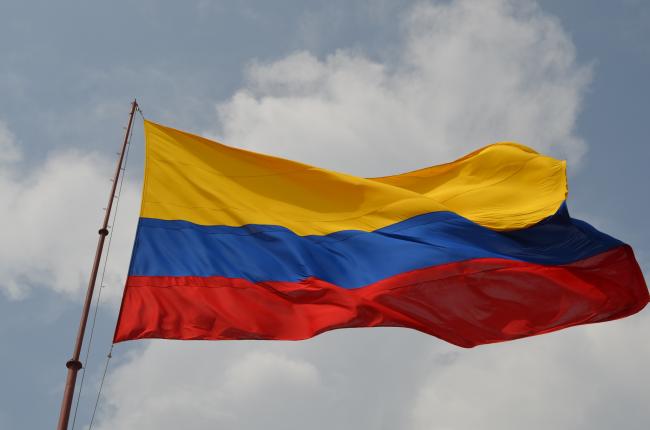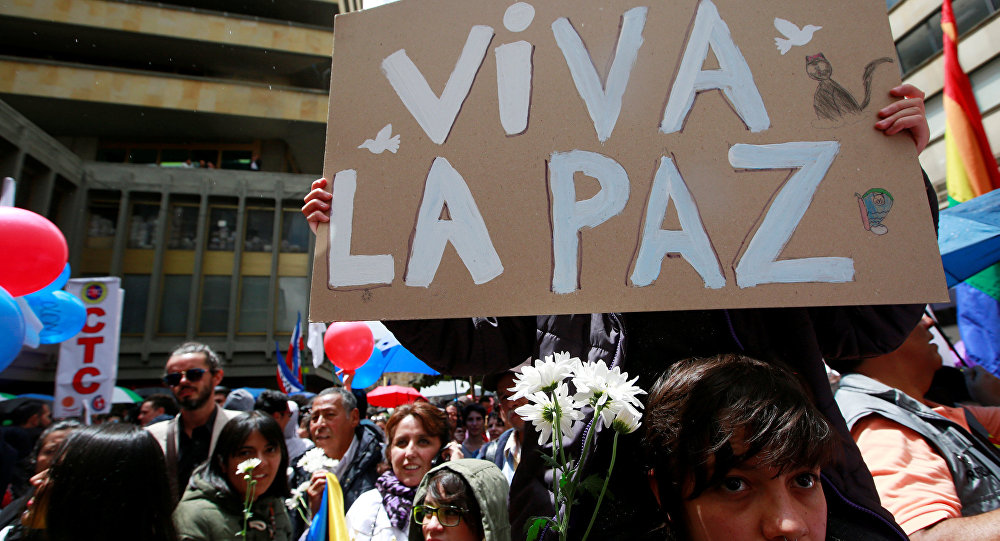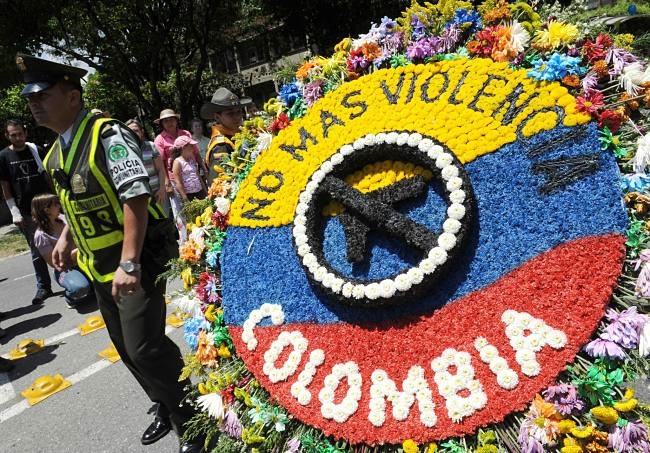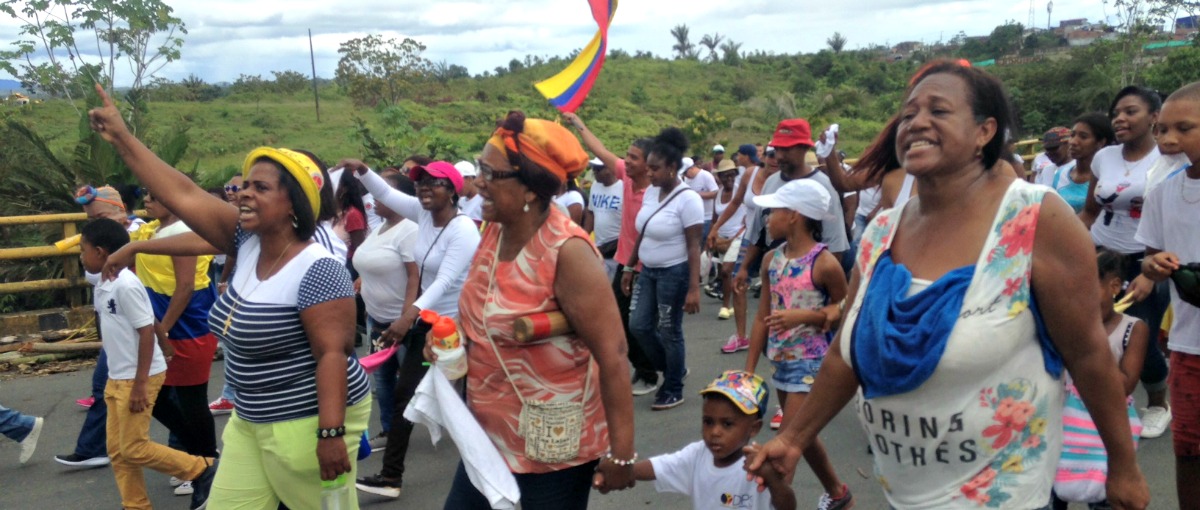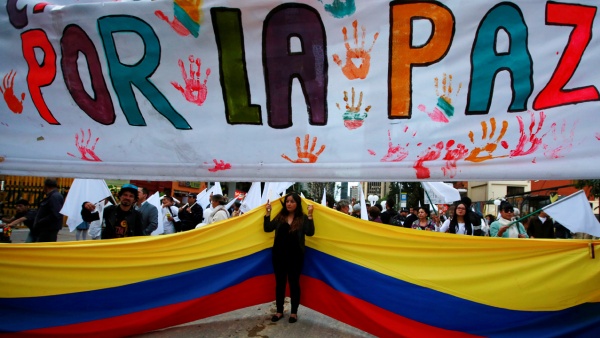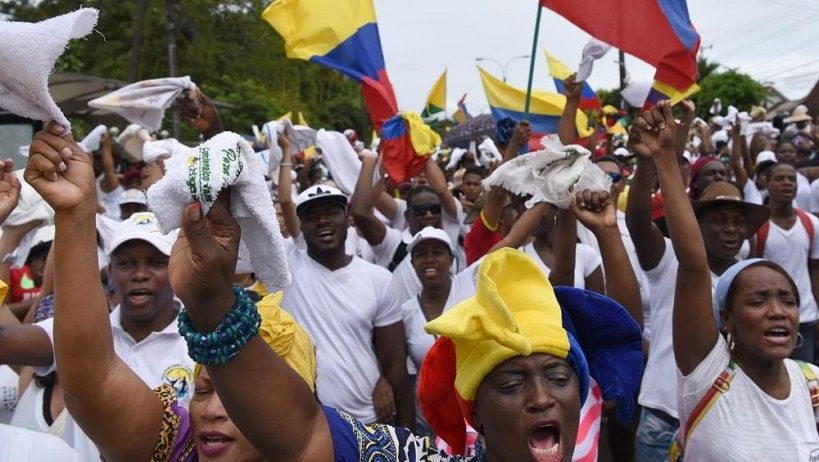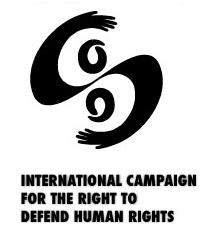Thanks to all those who participated in Days of Prayer and Action for Colombia. This year, nearly 500 faith leaders representing approximately 20 denominations from the U.S. and Colombia sent a letter to members of Congress, urging them to end military aid and aerial spraying and to oppose the U.S.-Colombia FTA. If you’re active in your faith community, feel free to share it there.
You can also send it to your Senators and Representative with a short cover note, asking them to reduce military aid to Colombia in the upcoming foreign aid bill. To keep your members of Congress informed, click here
https://www.crln.org/Foreign_Aid_Bill08
In the letter below, over four hundred church representatives-representing over 4.3 million Protestant, Catholic and Evangelical churchgoers and 20,000 congregations in the United States and Colombia-write to Congress to express their views on U.S. military and socio-economic assistance to Colombia as well as the pending U.S.-Colombia free trade agreement.
Signatories to the letter include the heads of the U.S. and Colombian Presbyterian Churches, the United Church of Christ, the Colombian Methodist Church, the Unitarian Universalist Association of Congregations, the U.S. and Colombian Mennonite Churches, the Colombian Conference of Men and Women Religious, the Leadership Conference of Women Religious, the Conference of Major Superiors of Men and a Catholic Bishop. Additionally, hundreds of regional and local church leaders from across the United States and Colombia, representing nearly twenty denominations, signed this letter.
The letter’s signatories call on Congress to:
• Further cut U.S. military aid to Colombia and aerial fumigation, which does not bring Colombia closer to peace, while significantly increasing aid for the poor, the displaced, refugees and the victims of Colombia’s armed conflict.
• Insist that the State Department strongly enforce the human rights conditions in law, key today due to an increase in killings of civilians as well as other human rights violations attributed directly to the Colombian Armed Forces.
• Do not ratify the U.S.-Colombia Free Trade Agreement, which would increase the already concerning poverty rate among rural Colombians, would put Colombia’s food security at risk and lacks sufficient protections for workers and Colombia’s bio-diverse environment.
U.S. and Colombian Church Leaders Call on Congress to Substantially Reduce Military Aid, to Strengthen Human Rights Protections and to Vote No on the U.S.-Colombia FTA.
And the work of righteousness shall be peace;
and the effect of righteousness quietness and assurance for ever.
Isaiah 32.17
Honorable Members of the United States Congress Washington, D. C.
Dear Members of Congress:
We, the undersigned, are U.S. and Colombian people of faith, convinced that God calls us to be on the side of the weak, the victims and the poor. For this reason, as representatives of numerous faith communities and churches, we come to you because we understand that soon you will consider two pieces of legislation that would have a significant impact on Colombia-U.S. military and social assistance through Plan Colombia and the U.S.-Colombia Free Trade Agreement. We write in the hope that your decisions may build the foundation for dignified life for all and promote the justice and peace that we so desire.
For more than 50 years Colombia has suffered through armed conflict, violence, inequalities and injustices. The civilian population is most affected by the armed conflict. More than four million people have been displaced from their lands. This conflict kills more than 3,000 people annually and tens of thousands of paramilitary and guerrilla victims today call for truth, justice and reparations. Meanwhile, the United Nations indicates that more than 45 percent of the Colombian population lives in poverty.
We have closely followed the congressional debates regarding human rights in Colombia and the balance between U.S. military and social aid for Colombia. We applauded Congress’ achievement last year when you cut $142 million in military aid and added $97 million in social aid to the aid package. We know that this year President George Bush has once again called on Congress to pass an aid package with approximately 75 percent in military aid. We, who work with the victims of the conflict or accompany them from the United States, hope that Congress prioritizes work for peace and socio-economic assistance rather than military aid.
At the same time, we know that Congress may soon consider the ratification of the Free Trade Agreement negotiated between Colombia and the United States. Being faithful to our principles, we must view any public policy from the point of view of the poor and the victims. Therefore, in Colombia we must consider how the trade agreement would affect what the United Nations estimates are the close to nine million Colombians living in rural areas-the family farmer, the indigenous and the Afro-Colombians-80 percent of whom live in poverty, according to USAID.
According to the United Nations, 21 percent of employed Colombians work in agriculture, the vast majority in rural areas. Research on the impact of free trade agreements between underdeveloped countries, such as Colombia, and countries with large economies, such as the United States, show that underdeveloped countries lose a significant number of agricultural jobs. For example, independent studies indicate that in Mexico at least 1.3 million family farmers have been displaced from their agricultural production due to subsidized imports from the United States.
While in Mexico many of these family farmers have attempted to survive by migrating into the United States, in Colombia there would be a risk of increasing the number of internally displaced persons, a population that is already the second largest in the world. We are deeply concerned that the livelihood of the rural population-individuals who have already suffered greatly from the consequences of the armed conflict-would be further put at risk by this trade agreement. This population could then face decisions that have historically reproduced violence and poverty in Colombia: migration to urban settings, forced internal displacement, illicit crop production, recruitment by illegal armed groups, among other ill-fated consequences.
We are also concerned that the U.S.-Colombia Free Trade Agreement would put Colombians’ food security at risk, as the country would, in large part, be dependent on U.S. imports for basic grains and other key foods for daily consumption. Furthermore, this trade agreement does not have sufficient protection for workers nor the environment. Such labor protections are particularly important in Colombia, the country with the highest number of murdered trade unionists. And without necessary environmental protections in the agreement, we would be jeopardizing Colombia’s environment, considered the second most bio-diverse in the world.
For that reason, we ask you, honorable members of Congress, to take into account the following requests before considering the proposed aid to Colombia or the ratification of the free trade agreement.
•
Further cut U.S. military aid and aerial fumigation, which does not bring us closer to peace in Colombia, while significantly increasing aid for the poor, the displaced, refugees and the victims of the armed conflict.
•
Insist that the State Department strongly enforce the human rights conditions in law, which is especially important as we are seeing a concerning increase in killings of civilians as well as other human rights violations attributed to the Colombian Armed Forces.
•
Do not ratify a U.S.-Colombia Free Trade Agreement, which would increase the already concerning poverty rate among rural Colombians, would put Colombia’s food security at risk and lacks sufficient protections for workers and Colombia’s bio-diverse environment.
Esteemed members of Congress, we ask that you consider our concerns in order to find the authentic paths for justice and peace for Colombia, the United States and the world.
Sincerely,
| Rev. Clifton Kirkpatrick Stated Clerk Presbyterian Church USA |
Rev. Juan Alberto Cardona Gomez Bishop Methodist Church of Colombia |
| Rev. John H. Thomas General Minister and President United Church of Christ |
Helis Barraza Diaz Moderator and President Presbyterian Church of Colombia |
| Rev. William G. Sinkford President Unitarian Universalist Association of Congregations |
Alix Lozano President Colombian Mennonite Church |
| Jim Schrag Executive Director Mennonite Church USA |
Sister Luz Marina Valencia President Conference of Men and Women Religious of Colombia |
| Bishop Thomas J. Gumbleton Archdiocese of Detroit |
Ricardo Esquivia Peace Commission Coordinator Colombian Council of Protestant and Evangelical Churches |
| Marie Lucey, OSF Associate Director Leadership Conference of Women Religious |
Jairo Barriga Jaraba Regional Secretary for Colombia, Cuba, Puerto Rico, Dominican Republic, and Venezuela Latin American Council of Churches |
| James E. Winkler General Secretary General Board of Church and Society United Methodist Church |
Rev. Jairo Suárez Director Justice and Life Office Evangelical Lutheran Church of Colombia |
| Wayne Miller Bishop Metropolitan Chicago Synod Evangelical Lutheran Church in America |
Sister Norma Inés Bernal Justice, Solidarity and Peace Coordinator Conference of Men and Women Religious of Colombia |
| The Rev. Dr. Jim Antal Conference Minister and President Massachusetts Conference United Church of Christ |
Rev. Dr. Davida Foy Crabtree Conference Minister Connecticut Conference United Church of Christ |
Father Javier Giraldo Moreno, S. J. Bogotá, Colombia |
| Rev. Dr. John R. Deckenback Conference Minister Central Atlantic Conference United Church of Christ |
Rev. John M Gantt Interim Conference Minister Central Pacific Conference United Church of Christ |
Father Emigdio Cuesta Pino SVD Provincial Counselor Missionaries of the Divine Word Colombia |
| Rev. Kent J. Siladi Conference Minister Florida Conference United Church of Christ |
Randy Hyvonen Conference Minister Montana-Northern Wyoming Conference United Church of Christ |
Sister Ester Giraldo S. Provincial Superior Consolata Missionaries Colombia |
| Duncan Smith Conference Minister Pacific Northwest Mennonite Conference Mennonite Church USA |
Wayne Hochstetler Executive Conference Minister Illinois Conference of Mennonite Church USA |
Jaime A. León President Claretiana Norman Pérez Corporation Colombia |
| Rev. J. George Reed Executive Director North Carolina Council of Churches |
Rev. Jose Luis Casal General Missioner The Presbytery of Tres Rios Presbyterian Church USA |
Sister Gloria Cecilia Lodoño Provincial Compañía de María Order Colombia |
| Tom Milligan Moderator Presbytery of the Miami Valley Presbyterian Church USA |
The Rev. Shannan R. Vance-Ocampo Monmouth Presbytery Presbyterian Church USA |
María Irma Sánchez President Daughters of Jesus of Kermaría Colombia |
| Sister Jan E. Renz, ASC Regional Leader, U.S. Region Adorers of the Blood of Christ |
Rev. John McCullough Executive Director and CEO Church World Service |
María Tardecilla Campo Sisters of Our Lady of Peace Colombia |
| Dave Robinson Executive Director Pax Christi USA: National Catholic Peace Movement |
Melinda St. Louis Executive Director Witness for Peace |
Sister Pilar Alonso Fernández Colombian Delegate Carmelitas of Charity Colombia |
| Mary Ellen McNish General Secretary American Friends Service Committee |
Arli Klassen Executive Director Mennonite Central Committee |
Sister Martha Lucia Mejía Local Coordinator Teresiana Colombia |
| Mark C. Johnson, Ph.D. Executive Director The Fellowship of Reconciliation |
Rick Ufford-Chase Executive Director Presbyterian Peace Fellowship |
Jorge A. Tobón Jaramillo Colombian Coordinator Brothers of Jesus Colombia |
| Joe Volk Executive Secretary Friends Committee on National Legislation |
Marie Dennis Director Maryknoll Office for Global Concerns |
Diana Milena Alzate Franco Community Director Sisters of the Sacred Family Colombia |
| Rev. Carol Rose Co-Director Christian Peacemaker Teams |
Cally Rogers-Witte Executive Minister of Wider Church Ministries, United Church of Christ and Co-executive, Global Ministries |
Sister Luz Marina Provincial Coordinator Santa Teresa de Jesus Community Colombia |
| David A. Vargas President, Division of Overseas Ministries of the Christian Church (Disciples of Christ) Co-Executive, Global Ministries |
Anne H. Griffis Chair National Action/Global Concerns Committee Church Women United |
Sister Silvia Conde Latin American Provincial Auxiliadoras del Purgatorio Congregation Colombia |
| T. Michael McNulty, SJ Justice and Peace Director Conference of Major Superiors of Men (CMSM) |
The Reverend Chris Pierson Director, Connectional Ministries Illinois Conference United Methodist Church |
Sister Yolanda Bocanegra Provincial Siervas de San José Colombia |
| Rev. Dr. Jerrold L. Foltz Associate Conference Minister Central Atlantic Conference United Church of Christ |
Rev. Patricia Barth Interim Associate Conference Minister Chesapeake Association Central Atlantic Conference United Church of Christ |
Claretianos Missionaries Western Province Colombia |
| The Rev. Dr. Lois K. Happe Regional Minister Connecticut Conference United Church of Christ |
Art Smoker Overseer, Tennessee-Carolina-Kentucky District Virginia Mennonite Conference |
Gloria Ulloa Executive Secretary Caribbean Coast Presbytery Presbyterian Church of Colombia |
| Rev Dr Michael S Penn-Strah South Central Regional Minister Connecticut Conference United Church of Christ |
Virgil Vogt Associate Conference Minister Illinois Mennonite Conference |
Rev. Diego Higuita Executive Secretary Caribbean Coast Synod Presbyterian Church of Colombia |
| Richard A.White Administration Ministry Team Central Pacific Conference United Church of Christ |
Sherry Mason Taylor Associate Conference Minister New Jersey Association Central Atlantic Conference United Church of Christ |
Rev. David Illidge Executive Secretary of the Central Presbytery Presbyterian Church of Colombia |
| David J Dutschke Parish Social Ministry Department Catholic Charities of Louisville Inc. Louisville, KY |
Gary Hougen Chair, Board of Church and Society Northern Illinois Conference United Methodist Church |
Osvaldo Ardila Frías Executive Secretary Colombian Ecumenical Network |
| Edgar Hiestand Ecumenical/Interreligious Office Northern Illinois Conference United Methodist Church |
Alka Lyall Chair, Outreach Ministry Area Northern Illinois Conference United Methodist Church |
Christians for Justice and Peace Colombia |
| Larry Greenfield Executive Minister American Baptist Churches of Metro Chicago |
Joetta Venneman Office of Global Ministries on behalf of Sisters of Charity of Nazareth Congregational Leadership Sisters of Charity of Nazareth Nazareth, KY |
Sister Cecilia Naranjo B Member of the Sacred Heart Order Representative Interreligious Justice and Peace Commission Colombia |
| Sr. Marian Durkin, CSA For the Congregational Leaders Sisters of Charity of St. Augustine Richfield, OH |
Sister Agnes Johnson, OP Vice President Racine Dominicans Racine, WI |
Jenny Neme Director Christian Center for Justice, Peace and Nonviolent Action-Justapaz Colombia |
| Sister Margaret Bulmer, CCVI Office of Social Concerns Sisters of Charity of the Incarnate Word Houston, TX |
Sister Marge Wissman, OSF Justice, Peace and Integrity of Creation Director Sisters of St. Francis Oldenburg, IN |
Carol Byler Director The Colombian Mennonite Foundation for Development (MENCOLDES) Colombia |
| Sister Kristine Vorenkamp Director of Religious Education Sisters of the Living Word |
Sister Jean Verber Coordinator Justice Outreach Office Racine Dominicans |
Jairo Muñoz Muñoz Director Fundación SERCOLDES Colombia |
| Provincial Council Clerics of St. Viator (Viatorians) |
Rev. Deborah Blood Chair of the Board of Directors United Church of Christ Wider Church Ministries and Common Global Ministries |
Amparo Beltrán Co-Director Grassroots Communication Center for Latin America (CEPALC) Colombia |
| Rev. Felix Ortiz-Cotto Executive Latin America and the Caribbean Global Ministries |
Rob Keithan Director, Washington Office for Advocacy Unitarian Universalist Association of Congregations |
Luz Dary Guerrero Coordinator Theological Studies Ministerial Program -PROMESA Colombia |
| Jean Stokan Policy Director Pax Christi USA: National Catholic Peace Movement |
Sara Pottschmidt Lisherness Director, Compassion, Peace and Justice Ministry General Assembly Council Presbyterian Church USA |
Rev. John Hernandez Director Lutheran Theological Seminary Evangelical Lutheran Church of Colombia |
| Rev. Dr. Mari E. Castellanos Justice and Witness Ministries United Church of Christ |
Barbara Gerlach Colombia Liaison Justice and Witness Ministries United Church of Christ |
Fabio Alonso Meza Ramírez Coordinator Ecumenical Peace School Colombia |
| Adonna R. Bowman Executive Director, Office of Disciples Women Christian Church (Disciples of Christ) |
Rev. Dr. Hunter Farrell Director, World Mission Presbyterian Church USA |
Albeiro Santana Pinzón Secretary General Apostolic Christian Evangelical Church of Colombia |
| N. Sharon Leatherman President Church Women United in Maryland |
Joan S. Brown President Ohio State Board of Church Women United |
Alba Luz Arrieta Cabrales National Coordinator Violence Alternatives Program Colombia |
| Judy Reimer President Nebraska Church Women United |
Marla McGarry-Lawrence Convener, Oregon Chapter Episcopal Peace Fellowship |
Jhon Fredy Cardona H. Western Regional Peace Commission Coordinator Colombian Council of Protestant and Evangelical Churches |
| Jim Vondracek Managing Director Chicago Religious Leadership Network on Latin America |
Brian Stefan-Szittai InterReligious Task Force on Central America Cleveland, OH |
Daniel Vargas R. Tolima Peace Commission Coordinator Colombian Council of Protestant and Evangelical Churches |
| David Horvath and Pat Geier Co-Chairs Kentucky Interfaith Taskforce on Latin America and the Caribbean Louisville, KY |
Paul Horst Colombia Sanctuary Project Coordinator Chicago Metropolitan Sanctuary Alliance |
Luz Amanda Valencia G. Women’s Network for Life and Peace Coordinator Colombian Council of Protestant and Evangelical Churches |
| Anne Barstow Co-Coordinator Presbyterian Accompaniment Program in Colombia |
Rev. Michael Joseph Global Ministries Missionary Peace Commission of the Evangelical Council of Colombia* |
Karina Torres Meriño Documentation for Advocacy Program Coordinator Peace Commission of the Colombian Council of Protestant and Evangelical Churches |
| Cynthia Lapp Pastor Hyattsville Mennonite Church Hyattsville, MD |
The Rev. John A. Nelson Pastor and Teacher Niantic Community Church (UCC/UMC) Niantic, CT |
Lucia Teresa Cardona Herrera Western Region Coordinator of Advocacy and Conflict Resolution Peace Commission of the Colombian Council of Protestant and Evangelical Churches |
| The Reverend Cheryl Pyrch Associate Pastor Rutgers Presbyterian Church New York, NY |
Patsy Taylor Griffith Lay Leadership Hope Presbyterian Church Austin, TX |
Martín Peinado Documentation for Advocacy Program Central Regional Coordinator Peace Commission of the Colombian Council of Protestant and Evangelical Churches |
| Dr. Jim Henkelman-Bahn Christ Congregational United Church of Christ Silver Spring, MD |
Rev. Daniel Dale Pastor Wellington Avenue United Church of Christ Chicago, IL |
Gladys Cecilia Cedeño Uribe Western Coordinator of the Women’s Network Peace Commission of the Colombian Council of Protestant and Evangelical Churches |
| Ryan Lambert Associate Minister First Congregational United Church of Christ Corvallis, OR |
Rev. Susan Leo Bridgeport United Church of Christ Portland, Oregon |
Wuillian Soto Rodriguez Pastor and Secretary Tolima Association of Evangelical Ministers Tolima, Colombia |
| Rob Hanson Sister Church Committee Chair Hyde Park Mennonite Church Boise, ID |
James F. Bundy Pastor Sojourners United Church of Christ Charlottesville, Virginia |
Henrry Martin Gonzalez Vice-President Tolima Association of Evangelical Ministers Tolima, Colombia |
| The Reverend Nancy Goede Pastor Mount Zion Lutheran Church Oak Lawn, IL |
Rev. Dr. Susan Newman Adjunct Minister Peoples Congregational UCC Washington, DC |
Rev. Milton Mejia Former Secretary General Presbyterian Church of Colombia |
| Rev. Joni Stoneking Forest Grove United Church of Christ Forest Grove, OR |
Rev. Dr. Donna J Martin Chaplain Heartland Hospice Baltimore, MD |
Miguel Ceballos Urbano President Nariño Association of Pastors Nariño, Colombia |
| Corliss Marsh The Dalles United Church of Christ The Dalles, OR |
Paul H. Saddler, D Min Pastor 12th Street Christian Church Washington, DC |
Jhon Jairo Londoño Valle Regional Coordinator Christian Crusade Church Valle, Colombia |
| Rev. Bee Neufeld Lake Oswego United Church of Christ (Congregational) Lake Oswego, OR |
Rev. Art Waidmann Bethesda United Church of Christ Bethesda, MD |
Marcial Marmolejo Zea Regional Coordinator for the Eje Cafetero, Northern Valle and Antioquia Evangelical Missionary Union Church Colombia |
| Rev. Pamela Shepherd Minister First Congregational United Church of Christ Ashland, OR |
Rev. John Clark Pegg United Church of Christ Pastor, retired Chair, Witness for Peace Board of Directors Duluth, MN |
Peter Stucky Pastor Teusaquillo Mennonite Church Bogotá, Colombia |
| Brenda Kame’enui First Congregational United Church of Christ Eugene, OR |
Rev. James E. Flynn Associate Pastor (ret) St. Mary’s Church Park City, UT |
Patricia Gallo Pastor Calarca Evangelical Missionary Union Church Quindío, Colombia |
| Rev. Caroline Zaworski First Congregational United Church of Christ Corvallis, OR |
Rev. Mansfield M. Kaseman Executive Director Community Ministries of Rockville Rockville, MD |
Rev. Eduardo Barajas Carrillo Pastor Emmanuel Evangelical Presbyterian Church Santander, Colombia |
| Ann Legg Mission Outreach Committee Ridgefield-Crystal Lake Presbyterian Church Crystal Lake, IL |
Rick Johnson Deacon Mission Outreach Ministry Ridgefield-Crystal Lake Presbyterian Church Crystal Lake, IL |
María Elena Racines C. Pastor San Juan Evangelical Lutheran Church Santander, Colombia |
| Lois M. Congdon Ecumenical Concerns Chair Manatee County Church Women United Bradenton, FL |
Carmelita Dunn Sister of Charity of Nazareth Louisville, KY |
Mary Luz Merchán Cáceres Pastor Emmanuel Presbyterian Church Santander, Colombia |
| Carol Wilson Missions and Social Concerns Team Leader Cheshire United Methodist Church Cheshire, CT |
The Rev. Dr. Sharon H. Ringe Professor of New Testament Wesley Theological Seminary* Washington, DC |
Rev. Omar Alberto Girón Jiménez Pastor Baptist Christian Church Santander, Colombia |
| J. Gregory Johnson Board Member Bethel Congregational United Church of Christ Beaverton, OR |
Rev. Beth A. O’Malley Pastor Columbia United Christian Church Columbia, MD |
Luis Alberto Rubiano Evangelist Christ the King and Lord Mission Evangelical Lutheran Church of Colombia Bogotá, Colombia |
| Rev. Paul B. Robinson (retired) United Church of Christ Medford, OR |
Rev. James A. Todhunter Christ Congregational Church, United Church of Christ Silver Spring, MD |
César García Pastor Torre Fuerte Church Mennonite Brethren Bogota, Colombia |
| Scot McGavin First Congregational United Church of Christ Boise, Idaho |
Rev. A. Rebecca West Associate Pastor Plymouth Congregational United Church of Christ Washington, DC |
David Ricardo Garcia Gomez Pastor Missionary and Alliance Church of Colombia Bogotá, Colombia |
| David Hiebert Scottdale Mennonite Church Scottdale, PA |
Rev. John Cooper-Martin Rockville United Church Rockville, MD |
Pedro Miguel Garcia Torres Professor Emeritus Universidad del Atlantico, Colombia |
| Mary Smith Coordinator Church Women United of Chemung County (NY) Elmira, NY |
Rev. Allison C. G. Smith Pastor Bethesda United Church of Christ Bethesda, MD |
Esther González Calvo Pastor Peniel Foursquare Church Bolívar, Colombia |
| Bea Haledjian Church Women United Trinity United Methodist Church Bradenton, FL |
Rev. James Colvin Pastor United Church of Christ Congregational Plainfield, NJ |
José William Valencia Pastor Girardot Mennonite Church Cundinamarca, Colombia |
| Rev. Lynne Smouse López Pastor Ainsworth United Church of Christ Portland, OR |
Rev. Paul Bryant-Smith Pastor First Congregational Church River Edge, NJ |
Cecilia Obrepon Pastor Madrid Mennonite Church Cundinamarca, Colombia |
| Bryce Miller Pastor Shalom Mennonite Fellowship Tucson, AZ |
Parrish Jones Minister Presbyterian Church USA |
Lucila Pabon Treasurer Teusaquillo Mennonite Church Bogotá, Colombia |
| Sally Schreiner Youngquist Pastor Living Water Community Church (Mennonite Church USA) Chicago, IL |
Donna Mast Co-Pastor Scottdale Mennonite Church Scottdale, PA |
Edith Arenas Pastor Jehová Sama Mennonite Church Bogotá, Colombia |
| Rev. Mamie Broadhurst Associate Pastor First United Church of Oak Park Oak Park, IL |
Rev. Charles L. Wildman Senior Pastor (Ret.) Rock Spring Congregational United Church of Christ Arlington, VA |
Edgar Pérez Secretary Afro-Colombian Ministries Team Bogotá, Colombia |
| Michael B. Bogard Associate Pastor Eden Mennonite Church Moundridge, KS |
Alice H. Foltz Council Secretary Wellspring United Church of Christ Centreville, VA |
Sister Ayda Orobio Local Superior Mother Laura Missionary Valle, Colombia |
| Teresa Aeschliman Peace Advocate Asheville Mennonite Church Asheville, NC |
Rev. Dr. Debra L. Duke Pastor Paramus Congregational United Church of Christ Paramus, NJ |
Ana Débora Garcés Health Ministries Coordinator Juan Bonal Colombia |
| J. Roy Hunsberger Elder Asheville Mennonite Church Asheville, NC |
Just Peace Committee Peace United Church of Christ Duluth, MN |
Michele Tordi Missionary Combonianos Colombia |
| Steve Goering Pastor Columbus Mennonite Church Columbus, OH |
Rev. Verne Arens Pastor Little River United Church of Christ Annandale, VA |
Francisco Fabres Belen Mission Colombia |
| Rod Stafford Pastor Portland Mennonite Church Portland, OR |
Rev. Holly MillerShank Minister Grace United Church of Christ Lebanon, PA |
Sister Lilia Suarez Compañía de María Colombia |
| Dr. Brenda Martin Hurst Pastor Frazer Mennonite Church Frazer, PA |
Rev Catherine Oatman Pastor United Evangelical, United Church of Christ Baltimore, MD |
Sister Amparo Tarazona Teresiana Colombia |
| Dan Malloy-Good Minister of Peace, Justice, and Evangelism Frazer Mennonite Church Frazer, PA |
Robert Hardies Senior Minister All Souls Church, Unitarian Washington, DC |
Dominican Sisters of the Presentation Bucaramanga Province Colombia |
| J. Mark Frederick Pastor Perkasie Mennonite Church Perkasie, PA |
Reverend W.J. Mark Knutson Pastor Augustana Lutheran Church Portland, OR |
Gina Zabala Secretary of the Caribbean Coast Presbytery Presbyterian Church of Colombia |
| Anna Margaret Engle Associate Pastor of Pastoral Care Lindale Mennonite Church Harrisonburg, VA |
Rev. Spencer Bradford Pastor Durham Mennonite Church Durham, NC |
Jesús Vargas Treasurer of the Caribbean Coast Presbytery Presbyterian Church of Colombia |
| Margaret Foth Congregational Peace Advocate Park View Mennonite Church Harrisonburg, VA |
Rev. Susan G. Latourette Associate Pastor First Church of Christ, Congregational UCC Middletown, CT |
Procura Claretiana De Misiones Chocó, Colombia |
| Shirley Yoder Brubaker Pastor Community Mennonite Church Harrisonburg, VA |
Martha Deputy Treasurer Victory Harvest Mission Church Bowling Green, KY |
Our Lady of Carmen de Riosucio Parish Chocó, Colombia |
| Barbara B. Flinn President Church Women United of Saint Lucie County Port Saint Lucie, FL |
Catiana McKay Pastor United Church of Rogers Park Chicago, IL |
Mama-U Cultural Center Chocó, Colombia |
| Naury Sanchez-Citron Pentecostal Church of Puerto Rico McCormick Theological Seminary Student Chicago, IL |
Randall Spaulding Pastor The Covenant Mennonite Fellowship Sarasota, FL |
Seglares Claretianas Chocó, Colombia |
| Kendra Grams Presbyterian Church USA McCormick Theological Seminary Student Chicago, IL |
Barbara Krehbiel Gehring Co-pastor Manhattan Mennonite Church Manhattan, KS |
Tagachi Y Bete Missonary Teams Chocó, Colombia |
| Laetitia S. Wells Presbyterian Church USA McCormick Theological Seminary Student Chicago, IL |
Robert Yates Pastor Pleasant Valley Mennonite Church Harper, KS |
Josué Gutiérrez P. Governing Elder San Bernabé Presbyterian Church Bogotá, Colombia |
| Ketharine Miller Presbyterian Church USA McCormick Theological Seminary Student Chicago, IL |
Louise Ranck Chairperson of Justice and Spirituality Committee Community Mennonite Church of Lancaster Lancaster, PA |
Julio Alberto Suarez Pastor Elim Christian Community Church Tolima, Colombia |
| Kristin Black Presbyterian Church USA McCormick Theological Seminary Student Chicago, IL |
Peter Degree Pastor Northford Congregational Church, UCC Northford, CT |
Nelson Larrota Pastor Vision to the Nations Church Tolima, Colombia |
| Danna E. Gobal University Church Chicago, IL |
Rev Paige Besse-Rankin Pastor Woodmont United Church of Christ Milford, CT |
Elias Cañon Pastor Antioquia Christian Church Tolima, Colombia |
| Robert Saler Professor Lutheran School of Theology Chicago, IL |
Rev. Wendy Mathewson Campus Minister DePaul University Chicago, IL |
Alvaro Ardila Pastor Family of God Arch Church Tolima, Colombia |
| Allison Halles McCormick Theological Seminary Staff Chicago, IL |
Andrea Leonard Former Young Adult Volunteer in Mission Presbyterian Church USA Atlanta, GA |
Aureliano Sanchez Pastor Evangelical Crusade Church Tolima, Colombia |
| Christopher R. Bentlin McCormick Theological Seminary Student Chicago, IL |
Edward R. DeLair, Jr. Miami Valley Presbytery Staff Presbyterian Church USA Zanesfield, OH |
Carlos Alberto Fierro Pastor Doors of Zion Church Tolima, Colombia |
| Laura Ilardo Justice and Witness Ministry, Board Member United Church of Christ Phoenix, AZ |
Rev. Jean M. McCusker Pastor United Church of Christ East Windsor, CT |
Cesar Augusto Giraldo Pastor Doors of Zion Church Tolima, Colombia |
| The Rev. Dr. Don Beisswenger Professor Emeritus Vanderbilt Divinity School Nashville, TN |
John Stoltzfus Associate Pastor Lombard Mennonite Church Lombard, IL |
Alfonso Chacon Pastor Rebirth Church Tolima, Colombia |
| Rev. Sally Houck Pastor Salem Evangelical Lutheran Church Stillwater, OK |
Rev. Jonathan Scanlon Resident Pastor Central Presbyterian Church Atlanta, GA |
Idali Rivera Pastor Christian Alliance Church Tolima, Colombia |
| Bill Coop Co-chair, Bi-National Service Presbyterian Church USA Brunswick, ME |
Rev. Toni Smith Retired Clergy United Church of Chester Chester, CT |
Luis H. Garcia Pastor Living Evangelism Church Tolima, Colombia |
| Rev. Jan Orr-Harter National Committee Presbyterian Peace Fellowship Aledo, TX |
Rev. Mr.Fred D. Milligan, Jr. Stewardship Specialist Lutheran Southern Seminary Columbia, SC |
Fernando Castillo Pastor Pan-American Prado Church of Tolima Tolima, Colombia |
| Rev. Cathryn Surgenor Accompanier in Colombia Presbyterian Peace Fellowship |
Joan A. Crook Publicity Chair Church Women United Asheville, NC |
Wuillian Ramirez Pastor Prado Christian Brotherhood Church Tolima, Colombia |
| Rev. Dr. Robert R. LaRochelle Pastor Congregational Church of Union Union, CT |
The Rev. Dr. Richard H. Craft Interim Pastor Family of Christ Presbyterian Church Greeley, CO |
Fredy Meza Pastor Christ Center Church Tolima, Colombia |
| Rev. Leah Hrachovec Associate Pastor First Presbyterian Church Stillwater, OK |
Fernando Gomez Presbyterian Church USA McCormick Theological Seminary Student Chicago, IL |
Nibardo Galindo Pastor Presbyterian Church of Natagaima Tolima, Colombia |
| Dr. B. Gordon Edwards Pastor First Presbyterian Church Stillwater, OK |
Danielle E. Wegman Public Policy Coordinator Chicago Religious Leadership Network on Latin America (CRLN) |
Ana B Herrera Presbyterian Church of Natagaima Tolima, Colombia |
| The Rev. Charles Booker-Hirsch Pastor Northside Presbyterian Church Ann Arbor, MI |
Pintor Sitanggang Student Lutheran School of Theology Chicago, IL |
Eison Angulo Pastor Purification Presbyterian Church Tolima, Colombia |
| Rev. Karen Jodice Pastor Broadview Community Church, UCC Hartford, CT |
Yu Young Kum Presbyterian Church McCormick Theological Seminary Student Chicago, IL |
Lucero Gonzalez Pastor New Life in Christ Church Tolima, Colombia |
| Rev. Edward Rawls Senior Pastor First Congregational Church Stratford, CT |
Seo Yang Lee McCormick Theological Seminary Student Chicago, IL |
Viviana Machuca Pastor Veraguas Brethren in Christ Church Bogotá, Colombia |
| Rev. Alison J. Buttrick Patton Associate Minister of Parish Life and Outreach First Church of Christ, UCC Simsbury, CT |
Barbara Clawson Lay Leader New Creation Community Presbyterian Church Greensboro, NC |
Father Tarcisio Gaitán Santa Gema Parrish Medellín, Colombia |
| Rev. Mary E. Breden Pastor Andrews Presbyterian Church Andrew, TX |
Betty Kersting Lay Leader First Presbyterian Church Santa Fe, NM |
Marleny Calle Muñoz Lay Leader Ibague Mennonite Church Tolima, Colombia |
| The Rev. Dr. Phineas Washer Madison Square Presbyterian Church San Antonio, TX |
Arch B. Taylor, Jr. Member of Mid-Kentucky Presbytery (honorably retired) Presbyterian Church USA Clarksville, IN |
Rev. Luis Fernando Sanmiguel Cardona Pastor Community of Hope Presbyterian Church Bogotá, Colombia |
| Tiffany Triplett Henkel Associate Pastor & Executive Director Metro Baptist Church & Rauschenbusch Metro Ministries New York, NY |
Dr. Leonard B. Bjorkman Moderator Emeritus Presbyterian Peace Fellowship Owego, NY |
Evelio Garcia Pedraza Pastor Love and Life of the Nations Missionary Union Church Quindio, Colombia |
| Rev. Edward P. Wegele Pastor First Presbyterian Church Seminole, TX |
Rev. Robert C. Lane Retired Clergy First Church in Windsor, CT, U.C.C. Windsor, CT |
Walter Ceballos Pastor Armenia Mennonite Church Quindio, Colombia |
| Orlando Redekopp Pastor Chicago First Church of the Brethren Chicago, IL |
Barbara Medina Accompanier in Colombia Presbyterian Peace Fellowship |
Vidal Jimenez Pastoral Coordinator Cachipay Mennonite Church Cundinamarca, Colombia |
| Rev. Matthew C. Miles Pastor First Presbyterian Church Fort Davis, TX |
Kenneth Trauger Retired Clergy United Church of Christ/Lancaster Interchurch Peace Witness Lancaster, PA |
Martha L. Gómez Pastoral Coordinator Pereira Mennonite Church Risaralda, Colombia |
| Kate De Braose Elder Westminster Presbyterian Church Roswell, NM |
Dr. Loise George Lay Leader United Methodist Church Asheville, NC |
José Antonio Vaca Pastoral Coordinator Ibagué – Calle 39 Mennonite Church Tolima, Colombia |
| Rev. John F. Moriarty Pastor First Presbyterian Church USA East Brady, PA |
Don Hamsher Pastor Kaufman Mennonite Church Davidsville, PA |
Amanda Valencia Pastoral Coordinator Ibagué – Modelia Mennonite Church Tolima, Colombia |
| Gail McDougle Pastor First Congregational Church, UCC Salem, OR |
Ron Adams Pastor East Chestnut Street Mennonite Church Lancaster, PA |
Jaime Guevara Pastor La Mesa Mennonite Church Cundinamarca, Colombia |
| Le Anne Clausen Director Center for Faith and Peacemaking Chicago, IL |
Emma Frederick Pastor Perkasie Mennonite Church Perkasie, PA |
Roberto Caicedo Pastor Ciudad Berna Mennonite Church Bogotá, Colombia |
| Reverend Gary Martin Lead Pastor College Mennonite Church Goshen, IN |
Lorie Hershey Pastor West Philadelphia Mennonite Fellowship Philadelphia, PA |
Henry Córdoba Pastoral Agent La Victoria Mennonite Church Bogotá, Colombia |
| Richard Gehring Co-pastor Manhattan Mennonite Church Manhattan, KS |
Barbara Moyer Lehman Associate Pastor Park View Mennonite Church Harrisonburg, VA |
Patricia Rosero Pastoral Coordinator Santa Marta Mennonite Church Bogotá, Colombia |
| Pam Dintaman Pastor Community Mennonite Church of Lancaster Lancaster, PA |
Ross Erb Associate Pastor for Children, Youth and Families Park View Mennonite Church Harrisonburg, VA |
Caleb Aranguren Pastoral Coordinator Villas de Granada Mennonite Church Bogotá, Colombia |
| Kori Phillips Lay Leadership Westminster Presbyterian Church Dayton, OH |
Aldine Musser Co-pastor Stephens City Mennonite Church Stephens City, VA |
Manuel García Pastor El Campito Mennonite Church Atlantico, Colombia |
| Ruth Stoltzfus Colombia Task Force, co-chairperson First Mennonite Church Urbana, IL |
Rev. Dr. Daniel Rodríguez Professor Emeritus McCormick Theological Seminary Chicago, IL |
Javier García Pastor North Mennonite Church Atlantico, Colombia |
| Ron Zook Pastor New Holland Mennonite Church New Holland, PA |
Mary Natger Episcopalian Church Chicago, IL |
Manuel Caicedo Pastor Sahagún Mennonite Church Córdoba, Colombia |
| Edith Beach Belleville Unit Church Women United Belleville, IL |
Sarah Henken Accompaniment Program Coordinator Presbyterian Church USA Chicago, IL |
Guillermo Vargas Director La Mesa Mennonite School Cundinamarca, Colombia |
| Rev. Charles Ross Pastor Emeritus Parkrose Community United Church of Christ Portland, OR |
Jane Tume Presbyterian Church USA McCormick Theological Seminary Student Chicago, IL |
Elizabeth Manco Pastor Guacarí Evangelical Missionary Union Church Valle, Colombia |
| Rev. Alan Claassen Pastor First Congregational Church of Murphys, United Church of Christ Murphys, CA |
Robert Worley Professor McCormick Theological Seminary Chicago, IL |
Geffer Mallorga Pastor Guacarí Evangelical Missionary Union Church Valle, Colombia |
| The Rev. Cecil Charles Prescod, OCC |
Jillian Scott |
Lesvi Vargas |
| Director of Christian Education and Youth Ministries Ainsworth United Church of Christ Portland, OR |
El Salvador Mission Project Co-Director First Congregational Church Eugene, OR |
Deacon Atria of the Great King Church Bogotá, Colombia |
| Rev. Forster Freeman, D.Min. Honorably Retired Presbyterian Church USA and United Church of Christ Portland, OR |
Liz Paulson Director, Christian Nurture Riverside Community Church Hood River, OR |
Jhon Byron Ramirez Worship Director Renovation and Life Church Risaralda, Colombia |
| Rev. C. Bunny Oliver Pastor Beavercreek United Church of Christ Beavercreek, OR |
Rev. Vicky Stifter Pastor Riverside Community Church, United Church of Christ Hood River, OR |
Beatriz Gómez H Pastor and Women’s Coordinator for District C Evangelical Missionary Union Church Colombia |
| James B. Ruyle Volunteer Minister Hillsdale United Church of Christ Portland, OR |
Rev. Tom Latimer Pastor Biltmore United Methodist Church Asheville, NC |
Roger Sieber Missionary Brethren in Christ Bogotá, Colombia |
| Rev. Roberta Williams Pastor Vernon United Methodist Church Vernon, CT |
Fr. Jeff Nicolas Pastor Epiphany Catholic Church Louisville, KY |
Santiago Espitia Pastor Brethren in Christ Church Bogotá, Colombia |
| Rev. Melanie A. Oommen Associate Minister First Congregational Church, United Church of Christ Eugene, OR |
Erin Flory Organizer for the Days of Prayer and Action for Colombia Shalom Mennonite Fellowship Tucson, AZ |
Carlos Alvarez Minister Brethren in Christ Church Bogotá, Colombia |
| Donna Edlin First Congregational Church Eugene, OR |
Rev. John Vest Associate Pastor Fourth Presbyterian Church Chicago, IL |
Rev. Vilma Yánez Presbyterian Church of Colombia |
| Rev. Andrew Schwiebert Pastor First Congregational Church of Oakland Oakland, CA |
Anita Yoder Kehr Pastor Berkey Avenue Mennonite Fellowship Goshen, IN |
Rev. Gustavo Gulfo
Presbyterian Church of Colombia |
| Rev. Dr. Jennifer Phillips Rector St. Augustine’s Church Kingston, RI |
Sylvia Shirk Charles Pastor Manhattan Mennonite Fellowship New York, NY |
Rev. Milciades Púa
Presbyterian Church of Colombia |
| Chester Topple Minister Westminster Presbyterian Church Santa Fe, NM |
Roger Miller Elder Asheville Mennonite Church Asheville, NC |
Marian Seagren Hall American Association of University Women–Wisconsin President-Elect Wausau, WI |
| Marty Gool Reverend Chatham-Bethlehem United Presbyterian Church Chicago, IL |
Justin Kurtz Elder Asheville Mennonite Church Asheville, NC |
Pat Conover Steward Seekers Church Washington, DC |
| Dr. Frederick Struckmeyer Peace Advocate Grove United Methodist Church West Chester, PA |
Rev. Susan Ortman Goering Pastor Columbus Mennonite Church Columbus, OH |
Michelle Tooley Eli Lilly Professor of Religion Berea College Berea, KY |
| Catherine M. Stanford Lay Leader, Coordinator of Public Theology Christ United Methodist Church Piscataway, NJ |
Tom F. Driver The Paul J. Tillich Professor of Theology and Culture Emeritus Union Theological Seminary New York, NY |
Sister Chris Dobrowolski IHM Pax Christi Louisville Louisville, KY |
| Rev. Jane H. Peifer |
Rev. Rebecca Messman |
Rev. Stephen Smith-Cobbs |
| Pastor Blossom Hill Mennonite Church Lancaster, PA |
Associate Pastor Trinity Presbyterian Church Herndon, VA |
Pastor Trinity Presbyterian Herndon, VA |
| John E. Harris Designated Pastor North Presbyterian Church of Flushing Flushing, NY |
The Rev. Rob Eller-Isaacs Minister Unity Church-Unitarian Saint Paul, MN |
Rev. Carolyn Roberts Pastor United Church of Christ of Seneca Valley Germantown, MD |
| The Rev. Walter L. Owensby Clergy – retired Presbyterian Church USA |
Rev. Steven Ostendorf-Snell Pastor Grace United Church of Christ Taneytown, MD |
The Rev. Janne Eller-Isaacs Minister Unity Church-Unitarian Saint Paul, MN |
| Rev. Dr. Fred M. Buker Board of Directors Central Atlantic Conference, United Church of Christ Williamtown, NJ |
Rev. Mark Greiner Pastor Takoma Park Presbyterian Church Takoma Park, MD |
Louise Green Minister of Social Justice All Souls Church, Unitarian Washington, DC |
| Malissa Haslam
Colombia Accompanier First Presbyterian Church Santa Fe, NM |
The Rev. Denise Giacomozzi May Minister Director United College Ministries in Northern Virginia* |
Jane Hanna Chair of the Mission & Social Concerns Committee First Presbyterian Church Santa Fe, NM |
| Rev. Juliet Sanson Bongfeldt Pastor Lutheran Church of the Good Shepherd Kingston, RI |
Dr. Rick Axtell Professor of Religion and College Chaplain Centre College* Danville, KY |
Rev. Megan M. Ramer Pastor Chicago Community Mennonite Church Chicago, IL |
| Rev. Ginna Minasian Dalton Pastor for Christian Education, Youth, and Evangelism Little River United Church of Christ Annandale, VA |
Elizabeth N. Oettinger Senior Minister First Congregational United Church of Christ Corvallis, OR |
Mary Ann Lambert Peace & Justice Committee St. William Church Louisville, KY |
* For identification purposes only.

